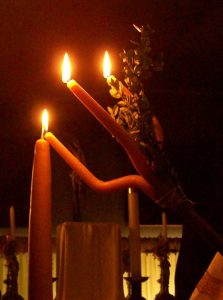Notice on the discipline concerning the Divine Offices and the receiving of the Sacraments.
I. – The pastoral care of the ASQC’s Priests.
Because it has fallen into abeyance – or rather because it has been systematically demolished by the 19th century’s militants, with the tacit support of eminent authorities – the doctrine of the states of life and the duties which govern them appear like a boundary between the neo-Catholicism and the Religion of our Fathers.
By neo-Catholicism, we do not mean the religion stemming from the last aggiornamento, and henceforth protected by pseudo-popes – but rather a certain idea of the religion which partisans assert to be “of always” and which is only the religion of “the day-before-yesterday”, rebuilt by the journalists and the militants, in the cacophony, hysteria and contempt (nay hatred) for the Episcopal institution. The only result the literature produced by the self-proclaimed saviours of the Church, – starting with the disastrous piece of work written by a certain Spanish priest –, was to reorganise the Catholic people into two antagonistic parties: on one side, the self-raised aware defenders of a “common good”, the pretext for all the transgressions of order and charity; and on the other side, the “liberals’” ragbag, which contains the most disparate and heterogeneous positions, and where are found, next to the authentic liberals, all those who did not want to step out of their rank in order to take on some functions which the order of things did not allow them to do – such people were scornfully called by Veuillot the “stew Catholics” .
There would be many things to be said about the real causes of the destruction of the Catholic tradition and the unsuspected origins of the present day religious crisis.
The ASQC’s Priests intend to practice the traditional discipline as it has been taught, for example, by S. Charles Borromeo in his instructions for Confessors, taking into account the weakening of the Catholic mentality in Modernity, as well as the spreading of the maxims of a lax moral and that of an aberrant practice of the Sacraments since some time now, unfortunately.
The sermons, homilies and conferences aim at giving to each state a teaching corresponding to its duties, with God’s help, because “this is the will of God, that by doing well you may put to silence the ignorance of foolish men: as free and not as making liberty a cloak for malice, but as the servants of God.” (I Pet. II, 15-16)
Consequently, do the Bishop and the Priests of the ASQC intend to dispense the Sacraments only when the faithful have entered the right attitude towards the state in which the Providence has placed them. Once again, the vocation to become a Christian does not consist in finding a “soul food” in order to live as one pleases, and even less to proclaim oneself the champion of a Church who never asked for it.
II. – Some further information.
The Augustinian and Sacerdotal Concord Clergy observes the ancient discipline concerning the receiving of the Sacraments and of Fasting.
Thus, rather than frequent communions being little or not prepared at all, we recommend to relatively rarefy the reception of the Sacraments with the intention of preparing oneself better so to receive them with more fruit.
The Augustinian and Sacerdotal Concord considers that those who see in Priests mere “sacrament dispensers” or even worse, as “Sacrament machines”, are totally mistaken. On the contrary, with S. Paul, we consider the Sacrament Ministers as the “dispensers of the mysteries of God” (I Cor. IV, 1), that is to say, as wise stewards, governing and ruling the household according to the will of Our Lord Jesus Christ, as taught by the Ancients.
The divine mysteries, may they be the holy Doctrine or the Sacraments, are not “distributed” indistinctly as with profane things, but rather dispensed according to the minister’s judgement.
Furthermore, the Augustinian and Sacerdotal Concord recommends the Eucharistic Fast in its ancient and venerable practice, that is absolute, abstaining from any food or liquid from midnight on.
Moreover, the introduction of the vernacular in the Divine Offices; the dialogued mass; the so-called « evening » mass, are as many practices that the Priests from the Augustinian and Sacerdotal Concord reject as being the signs of the subsequent reforms. – On the other hand, the faithful are strongly encouraged to read the texts of the mass to which they are getting ready to assist, so to better follow and understand the teaching which will be given from the pulpit during the sermon.
Likewise, as it has been said under the heading Profession, the Augustinian and Sacerdotal Concord Priests follow the liturgy promulgated under S. Pius X, by the apostolic Constitution Divino afflatu, and, consequently do not follow the new Holy Week promulgated in 1955.
If necessary, the faithful can ask the Priests who will submit the matter to the Bishop, who will grant the appropriate exemption, according to the mind of the ecclesiastical Discipline.
